World Language Department 6-12
Under Massachusetts General Laws, the study of World Languages (previously called Foreign Languages) is a core subject. M.G.L c. 69, 1D
Our Mission: To support multilingualism, promote lifelong learning, strengthen each student's heritage and identity, and build respect, equity, and inclusion in a multicultural world.
Our Vision: An empathetic student who engages in meaningful communication through language learning, accepts and respects diversity, broadens their horizons, and is capable of creating connections across different cultures.
World Language 6-12
EDUCATOR | COURSE | OFFICE HOURS |
Auvergne, Virginie | French | |
Bondanza, Paul | Spanish | |
French, Vanessa | Spanish | |
Haven, Isaac | Latin | |
Malley, Steven | Spanish | |
O'Sullivan, Jennifer | French | |
Pari-Di-Monriva, Anahi | Italian, Spanish | |
Stepper, Michelle | German | |
Teixeira, Dawn | Italian | |
Wagstaff, Denise* | French | |
Weider, Asha | Italian | |
*Department Lead Teacher |

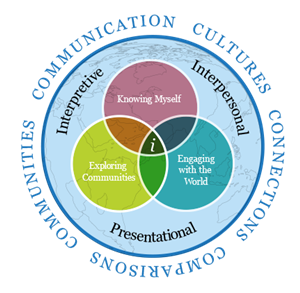
World Language Programming
The MVMMS and MHS World Languages program offers five languages: four modern languages: French, German, Italian, and Spanish; and one classical language: Latin. The curriculum of the World Languages Department is aligned with both the Massachusetts Curriculum Frameworks and the National Standards in Foreign Languages. The World Languages Department uses a proficiency-based approach to give our students access to both the language and culture of the languages we offer. Students work to build proficiency in the three modes of communication: interpretive (listening and reading), interpersonal (speaking and writing) and presentational (writing and speaking). Our courses are aligned with proficiency targets as indicated on the chart below*. It is the goal of our program that, after completing six consecutive years of World Languages (two in Middle School and four in High School), all of our students reach the Intermediate High level of proficiency on the ACTFL proficiency in all three modes of communication and four language skills. Students with prior experience in the languages offered by MHS and native or heritage speakers have the opportunity to take a placement test to determine their approximate performance level and will be placed in the appropriate course based on proficiency targets.
Proficiency Targets
MVMMS | Proficiency Target |
Grade 6 | Exploratory Program |
Grade 7 | Novice Mid |
Grade 8 | Novice High |
MHS | Proficiency Target |
Level 1 | Novice High |
Level 2 | Intermediate Low |
Level 3 | Intermediate Mid (1) |
Level 4 | Intermediate Mid (2) |
Level 5 | Intermediate High |
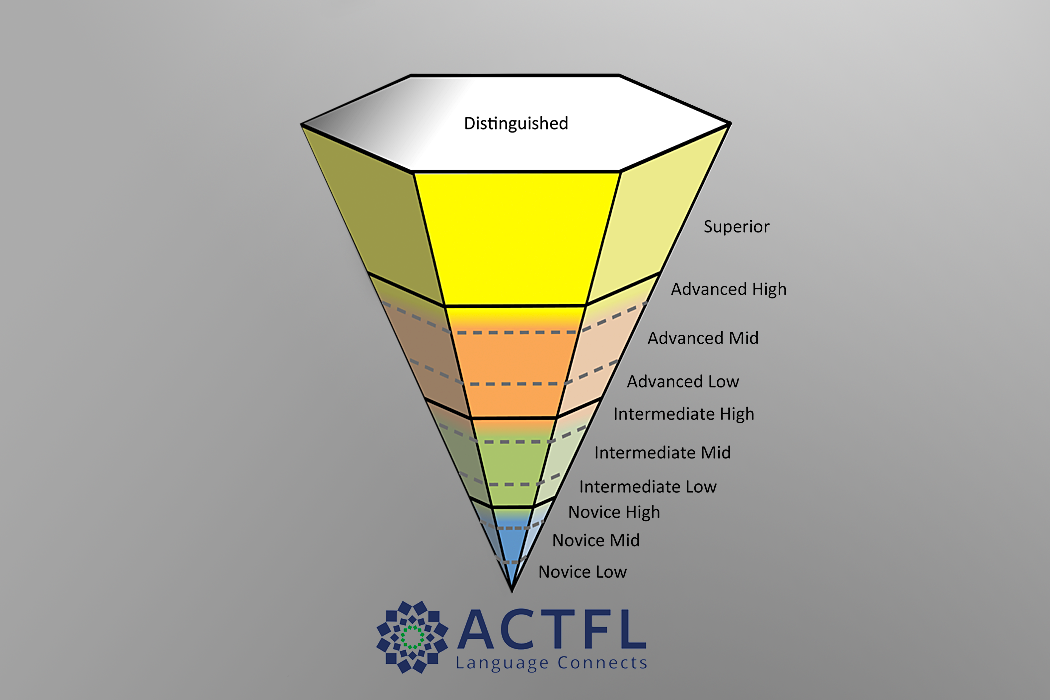
ACTFL Proficiency Levels
Novice Mid: students will be able to minimally show their ability to understand and use words, phrases, and formulaic language that has been practiced and memorized.
Novice High: students will be able to understand and use words, phrases, and formulaic language that has been highly practiced and memorized.
Intermediate Low: students will be able to express themselves and understand familiar topics of everyday life using sentences and series of sentences.
Intermediate Mid (1): students will be able to express themselves and understand familiar topics of everyday life, asking and answering questions, using language to express their thoughts and using a series of sentences or more complex sentences.
Intermediate Mid (2): students will be able to express themselves and understand familiar topics of everyday life, asking and answering original questions, creating with language to express their thoughts on a variety of familiar topics and using a series of sentences or more complex sentences.
Intermediate High: students will be able to maintain communication on familiar and new concrete topics, narrating in the past, present, and future with some control, and using paragraph-length discourse.
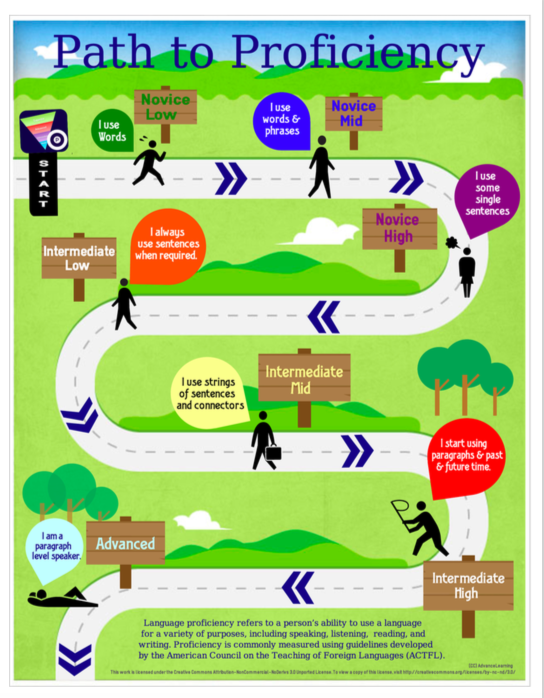
Our World Language Offering
Explore them all and choose the one that fit you better!
French is the second most widely learned World Language after English, and the fifth most widely spoken language in the world. More than 300 million people speak French on the five continents.
German is the second most commonly used scientific language in the world. It is the language of inventors and innovators. Almost a fifth of the world’s books are published in German. Germany is the second largest exporter in the world.
Italian ranks as the fourth most studied language in US colleges and high schools and it is spoken by 60 million people around the world. It is the language most linked to the world of art and culture and has influence in major areas such as painting arts, architecture, literature and music.
Latin has evolved and continues to influence today’s languages. It eases the transition into the Romance Languages, strengthens critical thinking & analytical skills and increases knowledge in English grammar and vocabulary which is still used significantly in science, law, and medical fields. Ancient Roman history and culture is the origin of many western cultures that includes classical mythology and have influenced storytelling for thousands of years.
Spanish is the second most spoken language in the world, you will be able to communicate with over 500 million people all around the world. There are over 400 million native Spanish speakers. Speaking Spanish will open the door to a rich and historically important culture. An increasing number of employers prefer to hire individuals who can speak Spanish fluently.
Level Up!
It’s recommended and encouraged that students continue with the language program up to Level 5.
However, most college require a minimum of 2 years of the same world language in high school to be considered for admission; many colleges recommend at least 3 years. And 4 years makes a student more competitive.
Students in Level 5 have the opportunity to take the course as Honor, Advanced Placement or Dual Enrollment with one of our university partners (Salem State University for Modern Languages or UMass Boston for Latin).
Seal Of Biliteracy
Melrose participates in the The State Seal of Biliteracy - an award given to seniors who have attained a high level of proficiency in English and a world language beginning with the graduating class of 2019. According to the Massachusetts Department of Education: “The State Seal of Biliteracy is an award provided by state approved districts that recognizes high school graduates who attain high functional and academic levels of proficiency in English and a world language in recognition of having studied and attained proficiency in two or more languages by high school graduation.” Melrose also partners with the Language Opportunity Coalition to offer supporting biliteracy awards. The chart below summarizes the awards and the criteria.
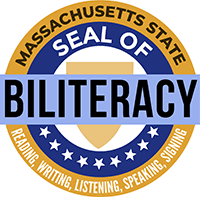
Pathway Award | Standardized Assessment Criteria for English and Partner Language |
State Seal of Biliteracy With Distinction | Score of Advanced on the grade 10 ELA MCAS |
State Seal of Biliteracy | Score of Proficient on the grade 10 ELA MCAS or Level 5 on ACCESS testing |
Language Opportunity Seal of Biliteracy | Score of Proficient on the grade 10 ELA MCAS or Level 4.5 on ACCESS testing |
Opportunities Beyond the Classroom
Exchange Trips and National/International Trips
MHS Students enrolled in World Languages have the opportunity to participate in the Exchange Trip to France, Germany, Italy, and Spain during the academic year. These exchanges run every two years. This is an amazing and rewarding experience that help creating long lasting relationships. Also, it's an opportunity to help narrowing differences and straighten similarities between communities; and support mutual learning and understanding among people of different backgrounds.
There are also other International Trips opportunities to Quebec (MVMMS French) and to Italy (MHS Latin); and National Trip to NYC (MVMMS Spanish).

Honor Society
At the end of junior year, students enrolled in a World Language course have the opportunity to apply for membership in the MHS World Language Honor Society. Successful candidates meet the following criteria: 1) have an overall GPA of 3.75 at the end of the first semester of their junior year; 2) have maintained an A average in their language studies throughout high school; 3) are in at least level II of their language; 4) show commitment to the language.

Global Education in Melrose (GEM)
Purpose and Philosophy
The MHS Global Education in Melrose (GEM) Program is designed to foster students’ global awareness, to recognize the accomplishments of students who represent the school around the globe, and to provide graduates with the essential skills for participating in and contributing to an increasingly global society.
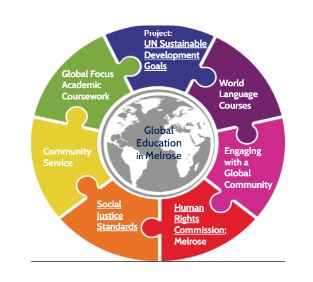
GEM is founded on the following principles:
Think Globally: I can increase knowledge of my relationship to the world; think about issues from a global point of view; and gain an appreciation for other world cultures, viewpoints, and perspectives.
Communicate Effectively: I can improve my world language skills and my ability to communicate with people across cultural and language differences.
Contribute Responsibly: I can use my global knowledge to interact and build relationships with people from other cultures; actively seek world knowledge to develop my own values and opinions; demonstrate respect, open-mindedness, understanding, and flexibility in behavior and thinking; and help others to embrace multiple perspectives.
